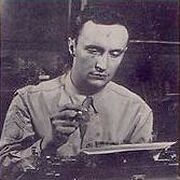Merle Miller (1919–1986)
Author of Plain Speaking: An Oral Biography of Harry S. Truman
About the Author
Image credit: Courtesy of the NYPL Digital Gallery (image use requires permission from the New York Public Library)
Works by Merle Miller
On Being Different: What It Means to Be a Homosexual (Penguin Classics) (1971) 238 copies, 3 reviews
Only You, Dick Daring or How to Write One Television Script and Make $50,000,000 (1964) 26 copies, 2 reviews
Associated Works
Tagged
Common Knowledge
- Birthdate
- 1919-05-17
- Date of death
- 1986-06-10
- Gender
- male
- Nationality
- USA
- Birthplace
- Montour, Iowa, USA
- Place of death
- Danbury, Connecticut, USA
- Places of residence
- Montour, Iowa, USA
Marshalltown, Iowa, USA
Danbury, Connecticut, USA - Education
- University of Iowa
University of London (London School of Economics) - Occupations
- Writer
novelist - Organizations
- Yank
Time
Harper's Magazine
Members
Reviews
Lists
Awards
You May Also Like
Associated Authors
Statistics
- Works
- 24
- Also by
- 1
- Members
- 1,711
- Popularity
- #15,004
- Rating
- 4.0
- Reviews
- 21
- ISBNs
- 57
- Languages
- 1
















